We explore how franchise brands are balancing authenticity with market demands. And why the UK has become the location of choice for European expansion
British consumers are becoming more travelled and society is becoming more multi-cultural. As a result, a variety of businesses inspired by cultures from around the world are gracing our shores, and among them are East Asian businesses looking to expand across the country via franchising.
For many of these businesses, despite Brexit, the UK is a necessary launchpad to access other European markets. As a result, we’re likely to see more East Asian brands with ambitious growth plans roll out franchise opportunities to those in the UK
However, loss of brand consistency and quality control can sometimes emerge from these scaling plans – a troublesome issue especially when many of the products on offer are so closely tied to their origin cultures. So, how are expanding brands getting this right? And how are they tailoring their brand to the British marketplace?
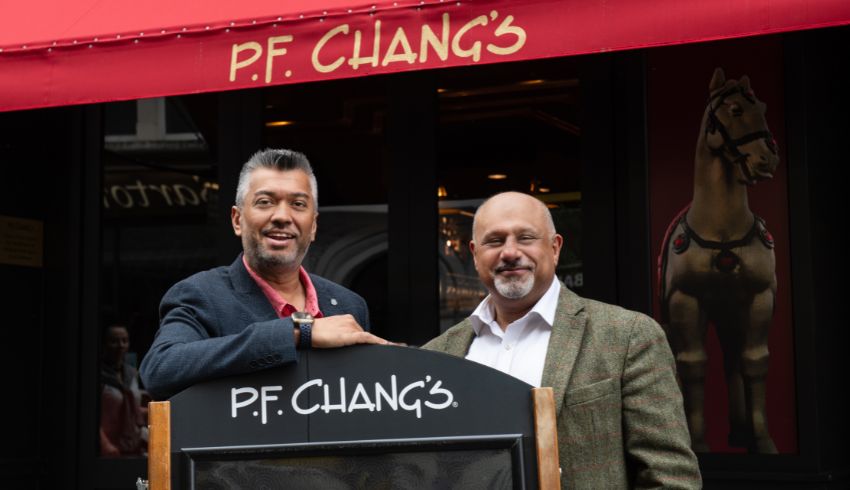
P. F. Chang’s
On the corner of London’s Chinatown sits P.F. Chang’s – a Pan-Asian restaurant that has presided over Leicester Square since 2017. Earlier this year, the location along with the master franchise rights to the UK was bought by Zaf Holdings, the owner of several Pizza Huts, KFCs, and Starbucks. Now, led by CEO Arif Jivraj, the brand is hoping to revamp the location and expand across the country, while staying true to the business’ American Chinese heritage.
“It’s very authentic in the way the brand grew from a mother and son concept,” says Arif. “Philip Chang then took that and made it more accessible in a street food concept. And then Peter Fleming came in and took that into a branded concept.” For the business this has meant creating a fine balance between presenting something fresh and appealing to UK consumers while also retaining the heart of the brand. The dishes in particular are intrinsic to the P.F. Chang’s dual heritage. As a result, the brand was hesitant to touch this part of the offering.
“Our menu items that started in 1993 are still the same menu items that we have today and how we serve them today is the same 30 years later” explains Arif. “We’re Pan-Asian cuisine because these are the recipes that we have offered over the years.”
The restaurant serves Chinese dishes such as prawn wonton and spring rolls as well as best sellers such as Mongolian beef and dynamite shrimp. While they retain the bold flavours of traditional dishes, they have been tailored to customer taste buds, which is a common reflection of immigrant cuisine. For example, when Chinese takeaways began to boom in the 1970s, chips made their way onto the menu because many entrepreneurial families had taken over old fish and chip shops.
It’s this amalgamation of cultures, reflected on P.F. Chang’s menu, that Arif believes creates an inclusive space for people to feel comfortable trying new things. “I think people misunderstand what the brand stands for,” he says. “We have a lot of Chinese dishes that make up the majority of the menu, but we still offer Japanese style food, Korean, and Thai. I think it’s a very safe environment to go and try different things.”
_.jpg)
Zaf Holdings has aimed to renew the brand through a complete redesign of its restaurant interior – a move that stresses the importance of offering a full dining experience rather than just focusing on the food.
“We focused on the operations and once we had confidence with what we were doing we turned the business around, grew the sales, and we could see we’d unlock that opportunity,” says Arif. “And so it was the right time to do the refurb and then talk about a relaunch, and talk about the fact that we’ve taken over the business. Our growth plans are quite ambitious because we believe in this.”
A big part of the revamp was artistically nodding to all the cultures that were acknowledged through the P.F. Chang’s menu. “When you look at the décor of P.F. Chang’s you’ll see the merging of Asian colours, such as red and gold - elegant but bold tones,” says Arif.
The brand is already incredibly popular in the Middle East and the US so has been able to continue capturing tourist footfall as they are already familiar with the brand. This means the business does not rely on walk-ins alone.
“The majority of customers that come to us know the brand so we don’t pick up walk-ins, but even the walk-ins that we do pick up are the ones that know about the brand.”
Now, Zaf Holdings’ focus will be on replicating P.F. Chang’s oversees success in the UK by introducing the brand to consumers who are currently unfamiliar. It’s hoping to achieve this by delivering a good all-round experience bolstered by its interior design revamp and anchored to its heritage.
“The UK is a very important market for us and through our partnership with Arif we’re really excited about growing in this market because I do believe from a brand standpoint, the UK is a door opener for the rest of the EU,” says Kishore Jukhoop, head of operations at P.F. Chang’s.
The end goal will be to open 100 sites across the UK, with 20 of those P.F. Chang’s restaurants opening up over the next decade.
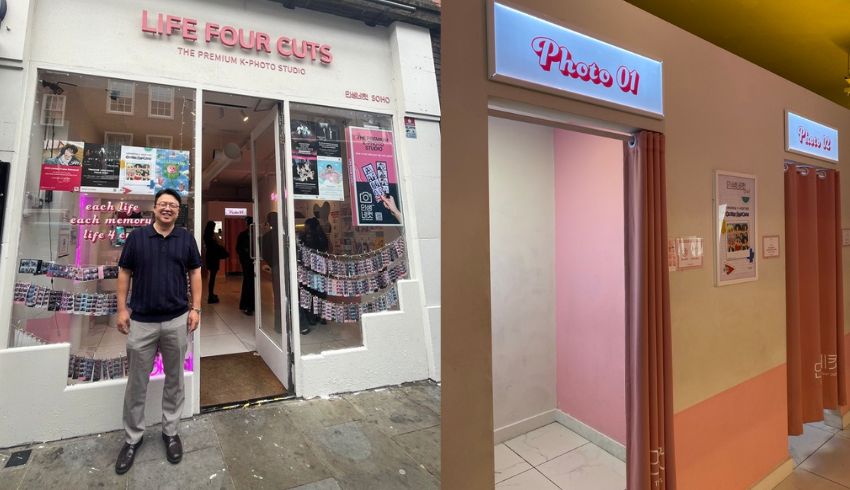
JS Holdings
South Korea has gained widespread global popularity over the past few years, and British consumers are among those enjoying the businesses that have sprouted from it. In fact, the hallyu wave (the movement of Korean culture) has experience a 15% year-on-year increase in terms of popularity – ranking second globally, according to the Korea Foundation for International Cultural Exchange.
One brand contributing to the dissemination of South Korean culture across the UK is JS Holdings. The business is responsible for several food, entertainment, and lifestyle brands, including Korean restaurant franchise Yori.
“A lot of people in Korea want to expand their brands to Europe,” confirms Jong Soon Kim, CEO and founder of JS Holdings and a well known figure in South Korea. “The Korean government invited me to do some lectures about how we’re expanding our business in Europe.”
One of the company’s latest ventures is a lifestyle and entertainment brand, Life 4 Cuts, which caught national media attention after King Charles visited the location last year. The business operates from a retail space, kitted out with photo booths and wearable accessories which customers can use to take printable photos which cost £8 a pop. It’s a concept that’s already very popular among younger generations of South Koreans, but Jong Soon had to consider how the brand would transfer to the British market.
“I was told that Western people don’t like taking pictures, only Asian people like taking pictures,” he says. “But everyone is a human being, and they want to make memories to keep and share with friends.” Jong Soon was correct in his analysis, and the booths have been popular.
However, not everything was completely transferrable to the British market, and the brand has made some changes to ensure its success. “When we did the market research, it showed that people here expect a more customised service and more attention to detail,” says Jong Soon. The research prompted the brand to reassess its self-service concept - Life 4 Cuts stores in South Korea are completely unmanned. “We decided to have one staff member in the store, we can greet them, explain what we have, and show them how to use the machine. That’s a new addition to the European version.”
.jpg)
The business has been looking ahead to how the brand can expand further, to ensure its longevity beyond the hallyu wave. Creating multiple revenue streams has been a big part of this, and something JS Holdings has introduced via a staggered approach.
“You can’t just stay here. You have to evolve yourself,” explains Jong Soon. “We wanted to introduce the photo booth first, then a few months later we introduced K-Pop star frames, and then six months later we introduced goods. Every six months, every year, we want to add to the business.”
The next step will be to introduce K-Pop albums and K-beauty items to sell in store, as customer research has shown this is likely to be of interest to the British consumers gracing Life 4 Cuts. For, JS Holdings these innovations are important developments in cementing their already established growth in the UK – a country that they see as an entryway into setting up shop in the rest of Europe.
“We want to expose out brands in different areas, different locations, different countries, so franchising is the best option to do that.” Franchising has already proven intrinsic to the brand’s presence which now stands across 24 European countries and its hungry to take on franchisees who can propel the business even further.
“Franchisees must have a young mindset because this business must flow, it doesn’t stay in one place,” says Jong Soon. He sees the appeal here being the low-cost investment and low-level operations, enabling franchisees to take advantage of the East Asian boom without the responsibilities that come with a sector like food and beverage.
“This business is a really low cost,” he says. There’s only the royalty and the photo frame and print fee. It doesn’t have food costs and you don’t need to hire a lot of people. This is about maintaining the shop nicely. Whether it’s going to be you or it’s going to be your manager.”
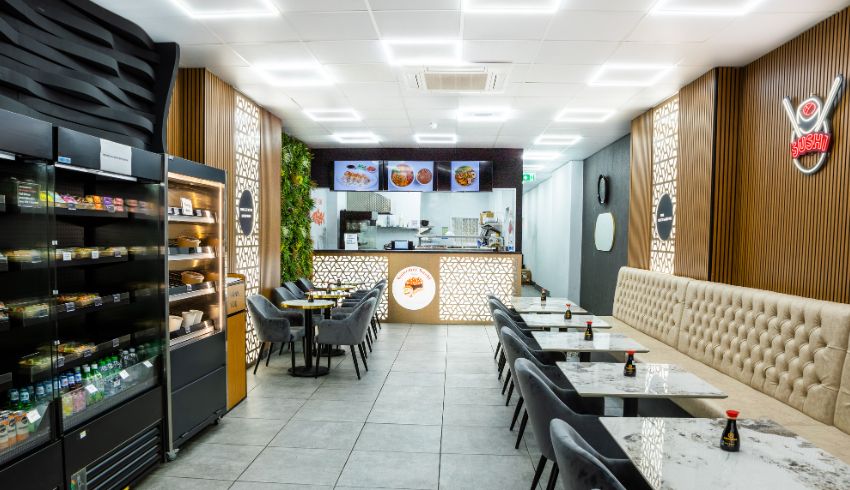
Gourmet Sushi
Home grown sushi franchise, Gourmet Sushi, was established in 2016 by Nuriddin Shamsutdinov, off the back of more than a decade of experience in the Japanese food industry. Although founded in London, the brand has aimed to retain elements of Japanese culture and cuisine within its dishes, while finely balancing the nuances of the UK market – something it views as it’s biggest challenge as well as a contributor to it’s success so far.
“One of our biggest challenges has been adapting to traditional Japanese cuisine to local tastes without losing authenticity, says Nuriddin. “We’ve overcome this by staying true to our roots while remaining flexible in how we present our dishes.”
The menu comprises sushi such as nigiri, crunch rolls, and maki – dishes all aimed at placing traditional dishes at the foundations, while making additions to accommodate British consumers. Getting this balance right can be difficult, but Gourmet Sushi has taken a ground up approach, consulting its customers throughout on its innovations. “Listening to customer feedback has been key – offering modern twists and adjusting for local preferences while never compromising on quality on tradition,” says Nuriddin.
Knowledge of Japanese culture has been a vital part of including traditional aspects within the business and this has extended to staff and franchisee training. “We have strict internal guidelines to ensure cultural authenticity across all aspects of our operations,” says Nuriddin. “This includes sourcing key ingredients where possible, training chefs appropriately, and adhering to traditional preparation techniques. We also ensure that our dining experience reflects the Japanese spirit of hospitality – known as omotenashi – which places the customer at the heart of everything we do.”
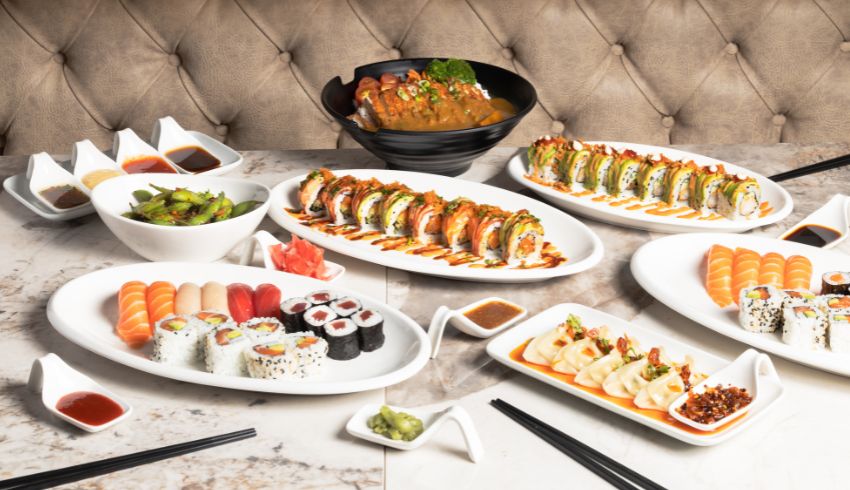
The franchise – which currently offers dine-in, take-away, and dark kitchen options – has also focused on bolstering its authenticity by creating an environment that reflects Japanese culture but avoids tropes. This has mainly been executed via the design of its interiors.
“We’ve worked hard to create a brand that honours the depth and sophistication of Japanese culture without resorting to cliches,” confirms Nuriddin. “Our design aesthetics are minimalist, inspired by the clean lines and natural elements found in Japanese architecture. We focus on subtle, respectful nods to the culture, such as a deep respect for balance and presentation, rather than overt symbols that may feel reductive or commercialised.”
Gourmet Sushi now has four locations across the UK, and is looking to scale via franchising, capitalising on what it sees as a growing area in food and beverage. In fact, Japanese cuisine is now in the top eight food options for British consumers ordering a take away – with 9% saying it’s their favourite choice, according to Statista.
“Over the past decade, we’ve seen a growing curiosity and appreciation for Japanese cuisine across the UK,” says Nuriddin. Initially, sushi was viewed as somewhat niche, but it’s now become a mainstream dining option. Consumers are more informed, adventurous, and open to trying new flavours and dishes beyond sushi, like ramen, tempura, and donburi.” Ultimately, appetite for East Asian products shows now signs of slowing down, which means it could be a promising market for franchisees that invest.
Image credit: Shutterstock/AtlasStudio
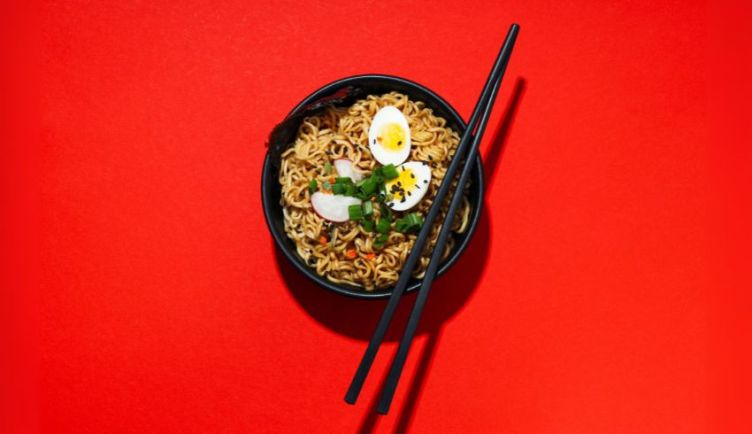

















_(1)_59_59_80_s.jpg)












